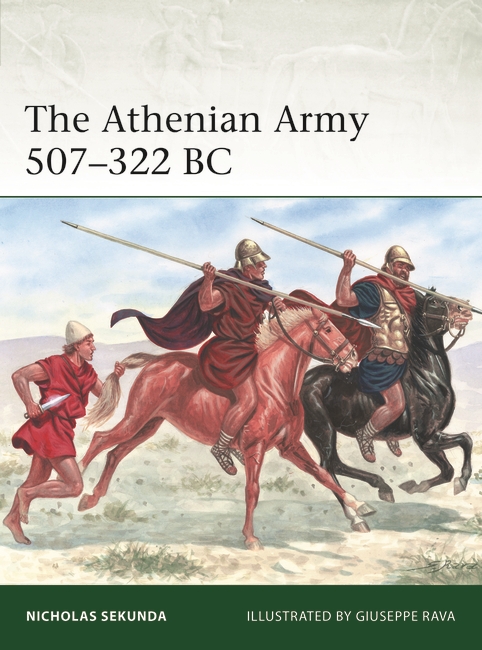
LIABILITY FOR MILITARY SERVICE
Liability for military service, and ephebic service, seems to have been practically universal. Lysias informs us (On the Refusal of a Pension 24.13) that in Athens an invalid was entitled to draw a pension of one obol a day. The detailed regulations changed later for the Athēniaōn Politeia inform us (49.4) that the law prescribed that men who possessed less than three mina (400 drachmas) and men who were so maimed in their bodies that they cannot do any work, were to be scrutinized by the boulē and given two obols a day. The register of invalids is also mentioned by Aeschines (Against Timarchus 1.103).
Certain categories of citizens were exempt from mobilization. As well as the invalids, these included those currently serving on the boulē. It seems, however, that the average age for service on the boulē was at least 40, so this did not amount to many. Those currently engaged in litigation were also exempt from military service. Andocides (Against Alcibiades 4.22) refers scornfully to the young men who were in court while the old men were out fighting. Isaeus (For Callius 5.46) claims that Dikaiogenes, though an Athenian citizen, had not served once during the present war, by which he seems to mean the Corinthian War (395–387).
Registration in the deme
When a male child had completed his 17th year, his name was entered on the list of citizens (lexiarchicon grammateion) for the deme in which his father was registered. Athenian personal names were made up of three elements: the person’s name, the person’s father’s name (patronymic) and the name of the deme in which the person was registered (demotic). This listing of names took place, presumably, at the beginning of the Athenian year in Hecatombaion. A fragment of Antidotus from his play entitled Protochoros (‘First Dancer’) and preserved in Athenaeus (Deipnosophists 6.240c) has a young man say: ‘before I was enrolled in my deme and received my ephebe’s cloak’. Antidotus was an Athenian comic poet of whom we know next to nothing, except that one of his plays was ascribed to him, but also to Alexis, whom we know to have been active c.340–330. Consequently, we cannot be sure if Antidotus was writing before or after the reform of the ephēbeia in 335.
Two months later, in the month of Boedromion (September/October), the young men went to the Temple of Aglauros and took the ‘ephebic oath’, stating that among other things, they would not disgrace their arms, would not desert their comrades, and would obey their commanders. According to Plutarch (Alcib. 15.4), in the aftermath of the Battle of Mantineia in 418 Alcibiades counselled the Athenians to maintain in deed the oath regularly taken by the ephēboi in the Temple of Aglauros. In his speech On the Embassy (19.303), delivered in 343, Demosthenes refers to his rival Aeschines reading out the oath taken by the ephēboi in the Temple of Aglauros. In his speech Against Leocrates (76), delivered in 330, Lycurgus refers to the oath sworn by all citizens, ‘as they are enrolled in the lexiarchicon grammateion’, then proceeds to give the oath. So, the point at which the oath was taken might have change with the reform. According to Diodorus Siculus (Hist. 11.3), the same oath was first taken for the first time by all the Greek forces at the Isthmus on the eve of the Plataea campaign, giving a slightly different version of the oath.
At some point in his induction into the ephēbeia, the Athenian ephēbos would be given a cloak, presumably on his taking the oath. Athenian ephēboi wore a black chlamys until ad 165/66, when Herodes Atticus paid for their replacement with white ones, ‘for before that time they had worn black cloaks whenever they sat in a group at public meetings, or marched in festal processions, in token of the public mourning of the Athenians for the herald Copreus, whom they themselves had slain when he was trying to drag the sons of Heracles from the altar’ (Philostratus, Lives of the Sophists 2.1.4). This action of Herodes Atticus is also attested in an inscription (IG ii² 2090, 5–10). According to a fragment of Philemon preserved in Pollux (On. 10.164), ephēboi also wore a petasos hat as well as their chlamys. Philemon was a comic poet working in Athens from c.330 onwards, where he was awarded Athenian citizenship.
The individual spent the next two years as an ephēbos, a term given to young men ‘arrived at their prime’ [hēbē], during which he was liable for military service within the borders of Attica. On entering his 20th year he became liable for military service outside the borders of Attica, an obligation that lasted until his 50th year. He remained liable for military service within the borders of Attica until his 60th year.
Find out more in The Athenian Army 507–322 BC


Comments
You must be logged in to comment on this post. Click here to log in.
Submit your comment